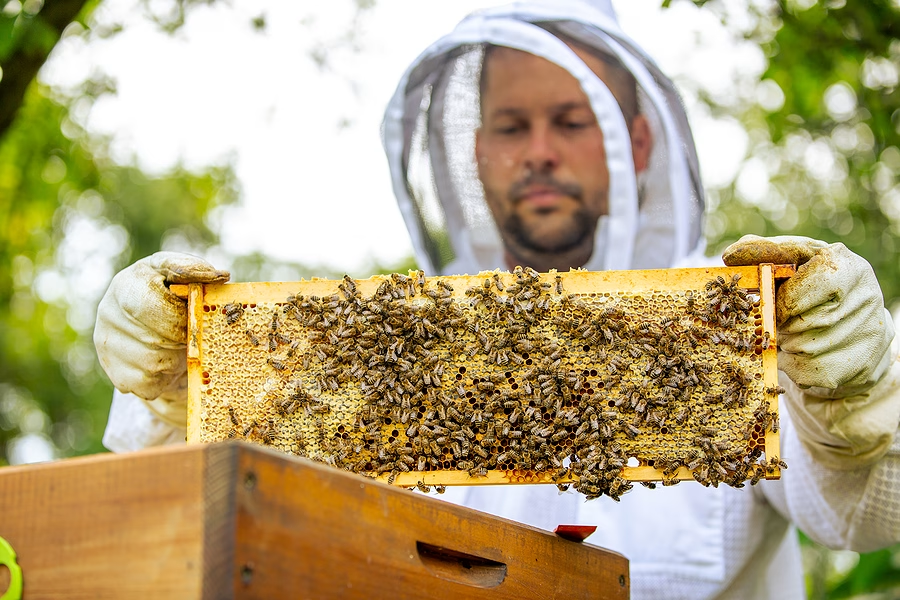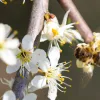No products in the cart.
Return To ShopThere has been a huge surge of interest in beekeeping in recent years, which is excellent news for promoting biodiversity, conservation and the rewilding of the British Isles as a whole.
If you are interested in bees, but are not quite sure what to expect, here’s a quick guide for complete beginners. There are also plenty of online resources, while the British Beekeepers Association has an extensive network of local branches where you can take introductory courses and gain practical experience.
What sort of space do you need?
Not much, enough for a hive with enough room for you to walk around it should do. First off, make sure you have a suitable space to place the hive. The best places are generally sunny, yet sheltered spot with plenty of protection from strong winds. You can also face the entrance of the hive towards a hedge or fence, this will encourage the bees to fly up to a higher flight path and keep them out of mischief.
What gear?
Besides the hive and you’ll probably need a couple, it’s more than wise to have beekeeper suit with a veil and long gauntlet like “rubber” gloves that cover the wrists (a great ping point the bees will utilise if given the chance).
Even the most fastidious of beekeepers that never get stung, get stung, so be prepared for some good old pings and the associated side-effects. Humour is a must. No human body part is sacred to a bee once it decides it’s going to get you, you just have to brace yourself, be brave and take it!
A sugar water/ syrup feeder, hive tool, bee brush, queen catcher, smoker and fuel are pretty much equipment prerequisites.
Obviously, you’ll also need a starter colony of bees. Source them from a reputable supplier (like us, obvs!) to minimise the risk of disease and ensure that you will have the right bees for the right job.
Not all bees are equal. You have your “locally adapted” bees, in essence these are complete and utter mongrels of pedigree unknown, you could and will get the odd world beater but more than likely you’ll get a nag, an also ran. Then you can get your pedigree bees, where the parentage is known back through several generations, with each generation being tried and tested, for traits such as calmness and gentleness, disease resistance, lack of swarming behaviour, fecundity and honey production. With these bees, only the best of the best are taken forward to the next generation.
The world of bees is a strange one, for in no other livestock species breeding programme do I know of advocates of the livestock parentage being unknown, as you could be getting anything from the breeding, when in actually fact you want to stack the genetics things in your favour to get the best. For example, if you want a derby winning greyhound, you don’t go out and buy a street cur pup.
When do you get your honey?
Honey generally can be harvested across the summer months, but is down to several factors.
The exact timing and amount of honey that is produced depends on variables such as local climate, even microclimate in some instances, colony strength, how far north, south, east, west you are, different honey flows that are dependent upon the various nectar sources in the area to which you have no control, and that maybe there one year and not the next – plus a fair bit of luck.
In summary, you’re reliant upon the British weather and one little fragile queen bee that you can’t even take to the vets. Then you have put a realistic value on a jar of honey, to cover both your time and effort as well as the bees, then you need to add a bit on to do the bees justice into what they have produced, then you have to reduce that price many times should you want to sell it.
Skills to half master.
It’s a decent idea to join or go visit your local beekeeping club to get a first hand feel of the emotional rollercoaster that is beekeeping. These groups have members on hand to give advice and have a wealth of experience at their disposal.
For example, they can show you how to inspect the hive quickly and efficiently while looking out for the signs of queen status. It’s not efficient time management to find the queen on every hive inspection for there are several quicker and easier pointers available demonstrating her presence, and then you’ve the odd bee disease to keep an eye out for. There’s nothing difficult about it all, but there’s stuff worth knowing.
However, be warned some people in these groups, while purporting to be world champion beekeeping legends, chat nonsense and are worth being taken with a pinch of salt. Weigh up the information given to you and make your own decision. Take nothing as gospel.
There will be a few fonts of genuine practical knowledge in these groups, some are complete mind boggling geniuses, albeit these guys are few and far between and have a conservation status akin to rhinos and orangutans. If they’re reading this, they know who they are.
Enjoy the rollercoaster.








